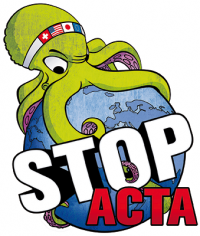Stop ACTA now (updated)
And now a break from our transport obsession focus, to look at the fascinating subject of international copyright law.
What is ACTA? It’s the worst thing to happen to the internet since C14Li5 ads. Actually, even worse than that – you can delete spam, but if ACTA is implemented, it’ll be like a rootkit for all your legal systems. Good luck deleting it at that point.
ACTA – the Anti-Counterfeiting Trade Agreement – is a multilateral (many nations) treaty being secretly negotiated now between 38 or so countries including the US, various EU states, Japan, Australia, New Zealand, and… Singapore. You might guess from the title that it’s all about stopping fake designer handbags from being sold as the real thang (TM), or melamine milk powder (think of the children!).
You would guess wrong, because those laudable objectives are cover for the real and far more nefarious purpose: pushing US copyright law across the whole world through the backdoor (Bahasa Melayu: “main belakang”), brought to you by the content distribution industries.
The proposed terms include:
- enhanced border searches for infringing materials – make sure you are carrying all the receipts or CDs for those tracks on your iPod or phone or computer
- mandatory criminal sanctions for copyright infringement
- forcing ISPs to monitor users for copyright infringment and hand over their details to copyright holders
- three-strikes internet disconnection for suspected – NOT convicted – copyright infringers.
Allow me to explain how this is equal to legislating through the backdoor.
Normally, for those of you with parliamentary lawmaking factories, laws are introduced by the party in power, debated, amended and then voted on in public. Of course, the parliamentary drafting has lately been outsourced to interested industry groups, but that is just an instance of garbage in, garbage out.
BUT – if said industry group can finagle a treaty among countries to implement certain laws to its liking – why then, that international treaty overrides local laws. And each government can go home to its peasants, er constituents, and claim “but we must implement this as the law of the land because we are obliged to honour our treaty obligations under international law! Think of the childrenz!!!111”. And so the treaty takes effect in all countries which signed up (38, remember).
But don’t just take it from me. Here’s the expert opinion:
Michael Geist, including a disappointing yet not unentirely unexpected reference to Singapore’s desire for opacity. What, you may wonder, could be the quid pro quo from the US in return for this client state advocacy of the head office’s preferred position?
Geist’s ACTA timeline (warning: slightly painful colour scheme)
Electronic Frontier Foundation
Der Speigel (Googlefied auf Englisch)
This is a distributed denial of service attack done in the shadows, like so many scurrying roaches.
What can you do to stop it?
– Complain to your elected representatives (if any, haha) or your nominated executive body involved in the negotiations. In Singapore, the whole deal is all so sooper sekrit, it’s hard to tell whether that should be Trade and Industry, Foreign Affairs, IPOS, or what? Just get hold of them all.
– (long shot) Write to your favourite content-distribution company and tell them that if they manage to get ACTA passed, you will stop buying their products. I’m putting this in the long shot category because an industry that sues its customers in an attempt to maintain its obsoleted business model is hardly going to be interested in said customers’ feedback, but your mileage may vary.
Get to it!
UPDATE 2010/06/20: The Free Software Foundation has published a firm, simple declaration on ACTA which you can sign. Of course this link is to the explanation of why the declaration is needed, after which you can jump to the declaration itself. What, you don’t expect to sign stuff on the Internet blindly, do you?
